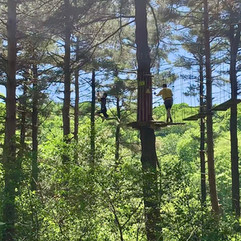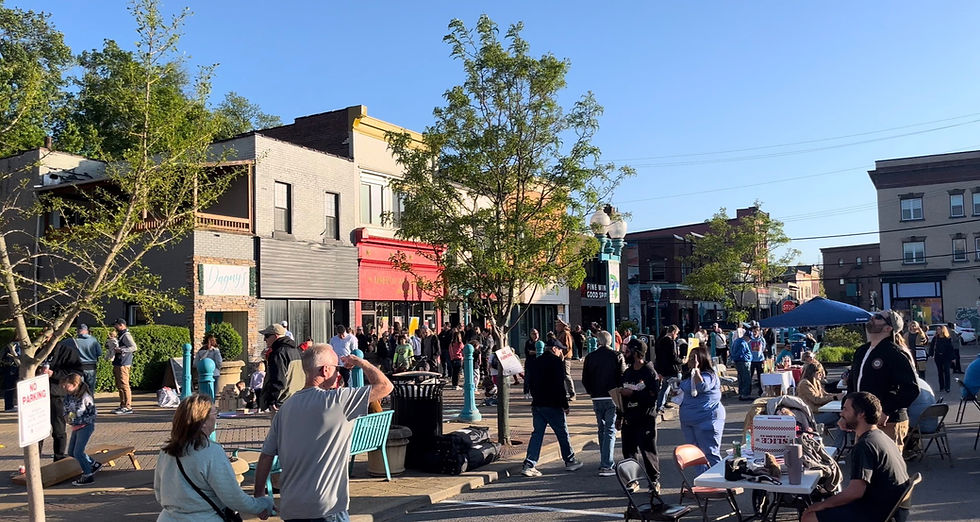Challenge Courses Build Confidence, Critical Thinking Skills
- Hilary Daninhirsch
- May 31, 2022
- 4 min read

Tackling obstacles, climbing across nets, zipping from tree to tree—it’s all in a day’s work at a challenge course.
Sometimes known as ropes courses, challenge courses have grown in popularity in recent years, and not just because of the serious fun that can be had. These courses promote a number of skills and talents, including risk-taking, team-building, confidence-boosting, problem-solving and critical-thinking, to name a few.
Pittsburgh’s newest course is Dragon’s Den, which is located in an historic converted church in Homestead. Cofounder and Creative Director Giulia Lozza Petrucci opened the space in September of 2020.
“We decided that during that very hard time when all local schools, the library and everything was closed, we needed to open because kids in Homestead didn’t have that much to do. We understand now the big price that mental health had to pay because of COVID,” she said, adding that the structure of the course enforces social distancing.
Petrucci said that she was inspired by an oratorio she attended in Italy, which she describes as “…a safe space next to each church. It’s a space where kids are free to walk in, to do all kinds of different activities. You can do homework there; you play with your friends. Sometimes there are structured activities, but the key is you can be yourself.
“The first thing an oratorio develops in children is the ability to quickly connect and find something that they have in common, something that they will enjoy playing together,” she continued. “When I came to this country, I missed that concept; that is something I had in mind to create.”
The location of the course, St. Mary Magdalene Church, had been abandoned for years, but the community valued the building and allowed Petrucci and her husband to repurpose it. After fundraising efforts and a great deal of work by 80 volunteers, as well as builders directly from Italy who helped design the ropes course, Petrucci was able to bring the oratorio concept to Pittsburgh.
After overcoming challenge after challenge in the building process, Dragon’s Den is now a treasured community space that is regularly used by kids of all ages and abilities. It features both an upper level course and a lower level course geared toward different ages and difficulty levels.
“The upper course is called the Soaring Dragons, and the Floating Dragon is the lower course,” said Petrucci.
There are 25 elements on the Floating Dragons course, 14 of which are targeted to kids under 10. Adults and kids over ten can do the Soaring Dragons upper course, which is 17 feet off the ground and more challenging. “The most popular is our flying snowboard. You need to go on a snowboard and you basically move from one platform to the other. That is psychologically, though not physically challenging,” said Petrucci.
Other components include balance beams, a 160-foot zipline, and a climbing wall.
Dragons Den offers both after-school programs, which is free for kids in the Homestead, West Homestead and Munhall neighborhoods, as well as summer camps with a different theme each week. For example, the ‘Sorcerer’s School’ focuses on creative problem-solving, while ‘Strong Like a Dragon’ is all about physical fitness.
Studies show that ropes courses increase self-confidence and self-awareness. “When you’re on the course, it’s you in front of a challenge,” said Petrucci. “You know you need to find the strength, and it’s more mental than physical. It can be terrifying, but you develop a plan in your head and see if works when you want to move from one platform to another.
“We work with children who are autistic and have ADHD; we see remarkable improvement,” she continued. “Our course is built in such a way that you choose your own challenge. It’s not a competition against the others; you are competing with yourself.”
Go Ape at North Park opened almost a decade ago and is one of 15 such courses in the country; the one at North Park is the only one in Pennsylvania.
“The main activity is called Treetop Adventure; it consists of a number of climbing elements. A lot of people think we just zipline, but there’s a lot more involved,” said Lance Huckabee, associate site manager in Pittsburgh.
The course is broken down into five units called sites. After a training session, which includes getting fitted and learning how to make safe connections, the participants go on a self-supervised activity over the five sites, tackling 39 obstacles and ziplining up to 440 feet. The course can be done in two to three hours, depending on the individual’s speed.
There is also another choice of activity called Treetop Discovery, which is a shorter version of the course that includes 20 obstacles and can be completed in about 90 minutes.
Huckabee has seen people in their 80s do the course, as well as people of all shapes and sizes; however, they do advise guests that it does require some upper body strength.
“We don’t want to discourage anybody, but it definitely pushes people out of their comfort zones; it’s a high-intensity experience, and for some it’s a bucket list item,” said Huckabee.
“One of the great things about our industry is getting to see people feel that accomplishment. We see the best of the best of people and push them outside their comfort zones. Almost always, they walk away feeling extremely positive with strong feelings of accomplishment,” he added.
Huckabee said that there are both small-level personal benefits and some larger-scale benefits. For example, team-building and having a shared experience, as well as overcoming fears by trying something difficult, can help you with other situations in life.
“On a larger scale, all Go Apes are partnered with public parks,” said Huckabee. “We’re partnered with Allegheny County Parks, and through a profit-sharing program, a portion of our proceeds go directly back to the park, helping to pay rangers and groundskeepers and to preserve nature.”
For more information, visit https://dragonsdenpgh.org or www.goape.com/location/pennsylvania-pittsburgh.




































Comments